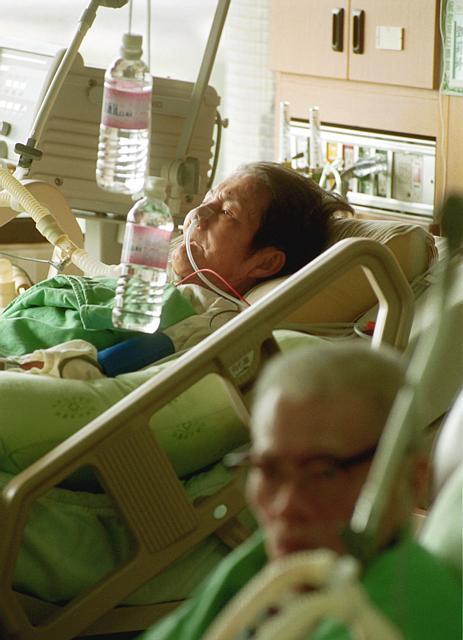A new respiratory care facility at Linkou's Chang Gung Memorial Hospital in Taipei County could help move longer-term patients out of intensive care (ICU) units at other facilities where resources are badly needed, hospital officials said yesterday.
At the same time, however, they disagreed on whether the plan -- eventually to include 20 such centers islandwide -- would actually ease resource burdens on the National Health Insurance plan as hoped.
"The Department of Health decided to [set up the center] because respiratory care patients are difficult to get out of ICU. Now they have an incentive because the Respiratory Care Center is more specialized," said Tsai Ying-huang (

PHOTO: GEORGE TSORNG, TAIPEI TIMES
Established in conjunction with the Department of Health (DOH), the new 24-bed facility is the fourth of its kind in Taiwan, said Justin Chang (
Encouraging patients on res-pirators to move directly from intensive care to a regular ward can be difficult, he said.
"As soon as you put them in a regular ward, the quality of care drops," Chang said.
Setting up this center as an intermediate or "step-down" facility offers specialized care at a lower cost to the National Health Insurance program than long-term stays in an ICU, Tsai said.
Chang, however, disagreed that the center would be cheaper for the health care system.
Treating chronic patients repeatedly, especially the elderly with often incurable ailments such as obstructive pulmonary disease, creates an undue burden on the health care system.
"Society, the country, and the government cannot afford to pay this forever," he said.
The center currently does not limit the number of times a patient may use its facilities.
Patients on respirators account for an average of 10 percent of those in intensive care, but this number is changing all the time, Chang said.
In addition to existing respiratory care centers, which include those in Hsinchu and Kaohsiung, the DOH plans to open as many as 20 centers in hospitals around the island, Chang said.
DOH financing helped the hospital buy equipment that would otherwise be beyond budget constraints, such as a NT$60,000 wheelchair equipped with a respirator which will help patients get around outside, Tsai said.
This wheelchair and other amenities are designed to raise the quality of care for the center's patients, most of whom face long-term hospital stays.
"Quality of care is not very important in Taiwan's hospitals. I hope this center will be different," said Lin Meng-chih (

KONG-REY: A woman was killed in a vehicle hit by a tree, while 205 people were injured as the storm moved across the nation and entered the Taiwan Strait Typhoon Kong-rey slammed into Taiwan yesterday as one of the biggest storms to hit the nation in decades, whipping up 10m waves, triggering floods and claiming at least one life. Kong-rey made landfall in Taitung County’s Chenggong Township (成功) at 1:40pm, the Central Weather Administration (CWA) said. The typhoon — the first in Taiwan’s history to make landfall after mid-October — was moving north-northwest at 21kph when it hit land, CWA data showed. The fast-moving storm was packing maximum sustained winds of 184kph, with gusts of up to 227kph, CWA data showed. It was the same strength as Typhoon Gaemi, which was the most

TECH EFFECT: While Chiayi County was the oldest region in the nation, Hsinchu county and city, home of the nation’s chip industry, were the youngest, the report showed Seven of the nation’s administrative regions, encompassing 57.2 percent of Taiwan’s townships and villages, became “super-aged societies” in June, the Ministry of the Interior said in its latest report. A region is considered super-aged if 20 percent of the population is aged 65 or older. The ministry report showed that Taiwan had 4,391,744 people aged 65 or older as of June, representing 18.76 percent of the total population and an increase of 1,024,425 people compared with August 2018. In June, the nation’s elderly dependency ratio was 27.3 senior citizens per 100 working-aged people, an increase of 7.39 people over August 2018, it said. That

‘UNITED FRONT’: The married couple allegedly produced talk show videos for platforms such as Facebook and YouTube to influence Taiwan’s politics A husband and wife affiliated with the China Unification Promotion Party (CUPP) were indicted yesterday for allegedly receiving NT$74 million (US$2.32 million) from China to make radio and digital media propaganda to promote the Chinese government’s political agenda and influence the outcome of Taiwan’s elections. Chang Meng-chung (張孟崇) and his wife, Hung Wen-ting (洪文婷), allegedly received a total of NT$74 million from China between 2021 and last year to promote candidates favored by Beijing, contravening the Anti-Infiltration Act (反滲透法) and election laws, the Chiayi District Prosecutors’ Office said. The couple acted as Beijing’s propaganda mouthpiece by disparaging Hong Kong democracy activists

EARLY ARRIVALS: The first sets of HIMARS purchased from the US arrived ahead of their scheduled delivery, with troops already training on the platforms, a source said The Ministry of National Defense (MND) yesterday said it spotted 35 Chinese military aircraft, including fighters and bombers, flying to the south of Taiwan proper on the way to exercises in the Pacific, a second consecutive day it has reported such activities. The Chinese Ministry of National Defense did not respond to a request for comment on the missions, reported just days before tomorrow’s US presidential election. The US is bound by law to provide Taiwan with the means to defend itself. Its arms sales to Taipei include a US$2 billion missile system announced last month. The MND said that from 9am yesterday,